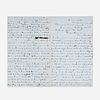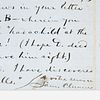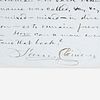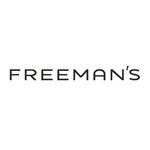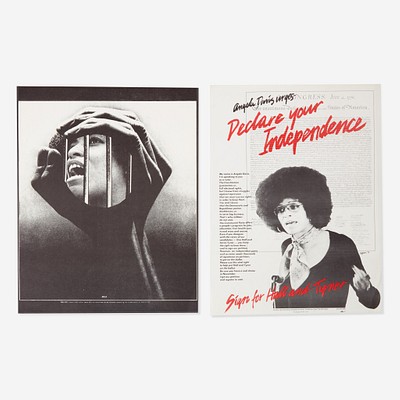[Literature] Twain, Mark (Samuel Clemens) Autograph Letter, signed
About Seller
2400 Market St
Philadelphia, PA 19147
United States
Established in 1805, Freeman’s Auction House holds tradition close, with a progressive mind-set towards marketing and promotion, along with access to a team of top experts in the auction business. And now with offices in New England, the Southeast, and on the West Coast, it has never been easier to ...Read more
Two ways to bid:
- Leave a max absentee bid and the platform will bid on your behalf up to your maximum bid during the live auction.
- Bid live during the auction and your bids will be submitted real-time to the auctioneer.
Bid Increments
| Price | Bid Increment |
|---|---|
| $0 | $25 |
| $500 | $50 |
| $1,000 | $100 |
| $2,000 | $200 |
| $3,000 | $250 |
| $5,000 | $500 |
| $10,000 | $1,000 |
| $20,000 | $2,000 |
| $30,000 | $2,500 |
| $50,000 | $5,000 |
| $100,000 | $10,000 |
About Auction
Sep 23, 2021
A collection of books and manuscripts. Curated by Darren WInston, Head of the Books and Manuscripts Department at Freeman's. Freeman's info@freemansauction.com
- Lot Description
"Latest from The Seat of War!"
At the outbreak of the Civil War, the day after Louisiana seceded from the Union, Mark Twain writes from New Orleans to his hometown friend and colleague
New Orleans, January 27, 1861. 5 pp., 9 x 5 1/2 in. (229 x 150 mm). Lengthy autograph letter, signed by Mark Twain twice ("Sam. Clemens"), to friend and Hannibal, Missouri-based journalist, George W. Beaman (1837-1917). Creasing from original folds; scattered ink smudging; minor edge-wear.
St. Louis Hotel
New Orleans Jan. 27, '61Latest from The Seat of War!
Express from St. Mary Street!
No Lives Lost! &c. &c.Dear Beaman:
We--Thrall and
I,--have just arrived, per horse rail-/road--(free passage, too--though why/they should compliment (sic) us in this way/surpasses my com (d--n such a pen,)/prehension,)--horse railroad, I believe/I said--(and most infernal cars they do/have on their street railroads here; with/three compartments in them, respectively/for gentlemen, ladies, and servants;/and a bench running fore-and-aft/on the hurricane deck for other people/--and we occupied that bench,) and--/per horse railroad, you know, from St./Mary street, No. 350,--on the gate--(but you/don't find the house by the number, Beaman/--ah, no--look for the benches over the/gutter--Stephenson's house is abreast the/bench which isn't painted--and mind,/if it's in the night, Stanard, Beware of the Dog./--not a poodle dog; nor a spaniel, nor/a "Tarrier;" nor any other species of the do-/cile, undecided sort of dog--but a/most astonishingly developed, and won-/derfully matter-of-fact brute of the New-/foundland persuasion, who don't care a/x x for anybody's arguments after dark/--and this reminds me of those beautiful/lines of Gray's--(you'll find them in his/"Elegy in a--well, really, now, I am not/right sure--though it runs in my head/that it was,--in a Brick-yard.")--never/mind that, though--n'importe--read the/poetry:/" Homeward the plowman plods his weary way,/And wastes his sweetness on the desert air."/Capital, ain't they? But they don't sound--that/is to say, ex--but no matter how they sound,/you know--Dogs is the question--and while I/am on the subject I may as well mention that/"Secession"--that's the oldest pup--(and the/pride of the family--so I was informed by/Miss Lizzie Stephenson,) is--dead--mel-/ancholy, but true. Blast the dog, he would/eat indigestible food, and so the "dangrey*"/got him. The other two pups, named respect-/*"Break-bone" fever" (Clemens's footnote)/
ively "Venus" and "Pilot," and aged about/the same as their deceased brother, are/doing well--remarkably well--so Miss/P-i-d-g-e-pidge-(right, I believe)--told/me--and she told me also to--Now/what in the world did that lovely damsel/tell me--unless--it might have been/something concerning a bet that Stanard/made about Miss Pidgeon's marriage,/and "which" that delightful young bird/imagines he is sorry he ever made it;/(and she isn't married yet--but she ought/to be, for she is a good girl,--and pretty.)/But not nearly so pretty as Babe, though./--(indeed--and I only whisper it--in the sub-/scriber's opinion--that Infant is a Stunner)./yes, she is--Stunner's the word. She is very/pretty--but I'll swear I used to think the other/the handsomest--d--n the italics--They/slip in without my knowledge some-/times./Glancing back over my letter, there/seems to be too much information, and/not enough comment--which is bad--/and reminds me of the ship captain who/gave his steward fifteen dollars to buy pro-/visions with, for a long voyage--and told/
him that, as times were hard, and the a-/mount small, he must lay it out/judiciously. Afterwards, this conversation/took place: Captain--"What-'d ye get?"/Steward--"Fourteen dollars' worth of rum/and a dollars' worth of bread." C.-(Rasp-/ing his words out with indignation almost/too deep for utterance)--"John!--What/--in the--hell--are you--goin' to do--/with--all that bread!" (word scribbled out)/But no matter--Miss Babe gave/me--and so did Miss Pidge--various/messages for you and Stanard--with/discretionary power to alter, amend,/add to, take from or invent--as, in/the plentitude of my wisdom I should/deem advisable--. Of them--of course/--we shall speak at greater length when/I get to St. Louis./But seriously--I blush--and I/not only blush, but I feel alarmed--deeply/concerned--about the news in your letter/referring to Dan & H.B.--wherein you/state that Dan & Habath "had a child" at the/same time." Horrible! (I hope D. died/in child--bed--and serve him right.)/P.S.--I feel relieved. I have discovered/that they only had "chills."/(Illegible) the service/Sam. Clemens/
P.S./
Beaman, you'll do to read the/Newcomes. Why when I read your letter/to Thrall, and lingered over that por-/tion of it which portrayed so lucidly/the relationship existing between Joel/and Reuben, and Louisa B., &c., &c.,/and not a single blunder in it, I en-/vied you your talent for dissecting kins-/manship--while a troop of uneasy/phantoms from the Newcomes strag-/gled through my brain, and I saw/poor Ethel, who was Clive's grandmo-/ther, you know--and Lady Kew, who/was sister to Lord Farintosh--and/Old Tom, and the Colonel and Lady Clara,/and the brave old hero of a hundred In-/dian battles, Barnes Newcome, Jr., and/the old gentleman who said "Adsum,"/when his name was called, &c., &c., &c.,/--mixed--mixed--mixed--in dire/confusion--so to remain forever/and ever. How can a man ever/understand that book?/
Sam. ClemensA fascinating and early--recently discovered--letter, full of rich detail and humor, from a 25-year-old Samuel L. Clemens, written four years before he took up his famous nom de plume, Mark Twain.
Written during Clemens's early career piloting steamboats up and down the Mississippi River, he writes to his Hannibal-based friend and fellow journalist, George William Beaman (1837-1917). From September 1860 to May 1861 Clemens piloted the steamboat Alonzo Child, alongside co-pilots Horace E. Bixby and Will Bowen, between St. Louis and New Orleans. It was a tumultuous period--the Union was fracturing, Civil War was imminent--when the Alonzo Child departed for New Orleans on January 14, 1861, the same day Mississippi seceded from the Union. Clemens landed in New Orleans some time between January 22-26, but when he sat down to write this letter from the St. Louis Hotel in the French Quarter, Louisiana had seceded the previous day, on January 26. Later, in 1908, Clemens reminisced about this time in New Orleans, "Great rejoicing. Flags, Dixie, soldiers." Writing to his friend Beaman--whom he met some time around 1857-58 in Clemens's hometown of Hannibal, Missouri, while they worked for the same newspaper, possibly the Messenger--he excitedly describes his visit to the home of prominent New Orleans steamboatman and cotton dealer Captain John A. Stevenson (1822-1901). At the time Stevenson was secretary of the Pilot's Benevolent Association, the trade union of pilots who made up the St. Louis-New Orleans trade route. Stevenson would go on to be mentioned in Twain's memoir about his steamboating days, Life on the Mississippi (1883): "Of course there were some few pilots that could judge of alligator water...but they had to have natural talent for it; it wasn't a thing a body could learn, you had to be born with it...Horace Bixby...John Stevenson...all A 1 alligator pilots. They could tell alligator water as far as another Christian could tell whiskey."
The outbreak of the Civil War would put an end to Clemens's steamboating, as Northern blockades essentially brought the trade to a halt, and this is one of the final known letter's by him while still piloting steamboats.
Despite the familiarity and friendship exuding from this letter, it is the only known surviving piece of correspondence between Clemens and Beaman. The outbreak of the Civil War would take them on very different paths. Beaman enlisted as a private in the 3rd Regiment, Missouri U.S. Reserve Corps, in May 1861, and in 1862 joined the United States Navy for a long and distinguished career, retiring as a Rear Admiral in 1899, while Clemens made his way back up the Mississippi to Missouri on April 18, before Union soldiers completely sealed it, and would infamously join the Missouri State Guard in his short lived moment as a "rebel" soldier. By the spring of 1861 he was on his way to Nevada to rendezvous with his brother Orion, and not long after would begin his career as one of America's most beloved writers.
This letter is partially-printed in Benjamin Griffin's Mark Twain's Civil War (University of California Berkeley, 2019).
Only 15 earlier letters are known to physically exist, as cited by the Mark Twain Project (some others exist but only as copies as the original letters have not survived). All 15 are to Clemens family members and this letter to George W. Beaman is the earliest known letter to survive written to someone outside of Clemens’s family.
According to auction records, this is the earliest fully datable letter to ever appear at auction and one of only three pieces in manuscript to ever to appear at auction. The two earlier records are for an undated letter, ca. 1857-61, offered in 1971 at Sotheby’s and an 1856 manuscript poem written for his sister-in-law, Mollie, that was offered in 2005, also at Sotheby’s.
Original recipient, George W. Beaman, thence by descent in the family.
Footnote:SLC to George William Beaman, 27 January 1861, New Orleans, La., (UCCL 13746)." Catalog entry. Mark Twain Project Online. Berkeley, Los Angeles, London: University of California Press. 2016. Accessed 2021-08-09.
- Shipping Info
-
No lot may be removed from Freeman’s premises until the buyer has paid in full the purchase price therefor including Buyer’s Premium or has satisfied such terms that Freeman’s, in its sole discretion, shall require. Subject to the foregoing, all Property shall be paid for and removed by the buyer at his/ her expense within ten (10) days of sale and, if not so removed, may be sold by Freeman’s, or sent by Freeman’s to a third-party storage facility, at the sole risk and charge of the buyer(s), and Freeman’s may prohibit the buyer from participating, directly or indirectly, as a bidder or buyer in any future sale or sales. In addition to other remedies available to Freeman’s by law, Freeman’s reserves the right to impose a late charge of 1.5% per month of the total purchase price on any balance remaining ten (10) days after the day of sale. If Property is not removed by the buyer within ten (10) days, a handling charge of 2% of the total purchase price per month from the tenth day after the sale until removal by the buyer shall be payable to Freeman’s by the buyer. Freeman’s will not be responsible for any loss, damage, theft, or otherwise responsible for any goods left in Freeman’s possession after ten (10) days. If the foregoing conditions or any applicable provisions of law are not complied with, in addition to other remedies available to Freeman’s and the Consignor (including without limitation the right to hold the buyer(s) liable for the bid price) Freeman’s, at its option, may either cancel the sale, retaining as liquidated damages all payments made by the buyer(s), or resell the property. In such event, the buyer(s) shall remain liable for any deficiency in the original purchase price and will also be responsible for all costs, including warehousing, the expense of the ultimate sale, and Freeman’s commission at its regular rates together with all related and incidental charges, including legal fees. Payment is a precondition to removal. Payment shall be by cash, certified check or similar bank draft, or any other method approved by Freeman’s. Checks will not be deemed to constitute payment until cleared. Any exceptions must be made upon Freeman’s written approval of credit prior to sale. In addition, a defaulting buyer will be deemed to have granted and assigned to Freeman’s, a continuing security interest of first priority in any property or money of, or owing to such buyer in Freeman’ possession, and Freeman’s may retain and apply such property or money as collateral security for the obligations due to Freeman’s. Freeman’s shall have all of the rights accorded a secured party under the Pennsylvania Uniform Commercial Code.
-
- Buyer's Premium



 EUR
EUR CAD
CAD AUD
AUD GBP
GBP MXN
MXN HKD
HKD CNY
CNY MYR
MYR SEK
SEK SGD
SGD CHF
CHF THB
THB![[Literature] Twain, Mark (Samuel Clemens) Autograph Letter, signed](https://s1.img.bidsquare.com/item/l/9242/9242459.jpeg?t=1MmbGd)
![[Literature] Twain, Mark (Samuel Clemens) Autograph Letter, signed](https://s1.img.bidsquare.com/item/s/9242/9242459.jpeg?t=1MmbGd)
